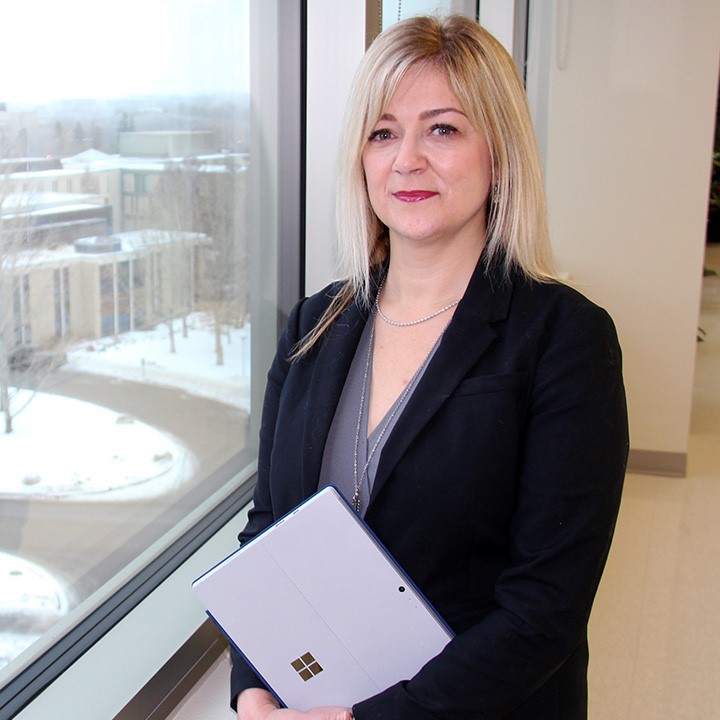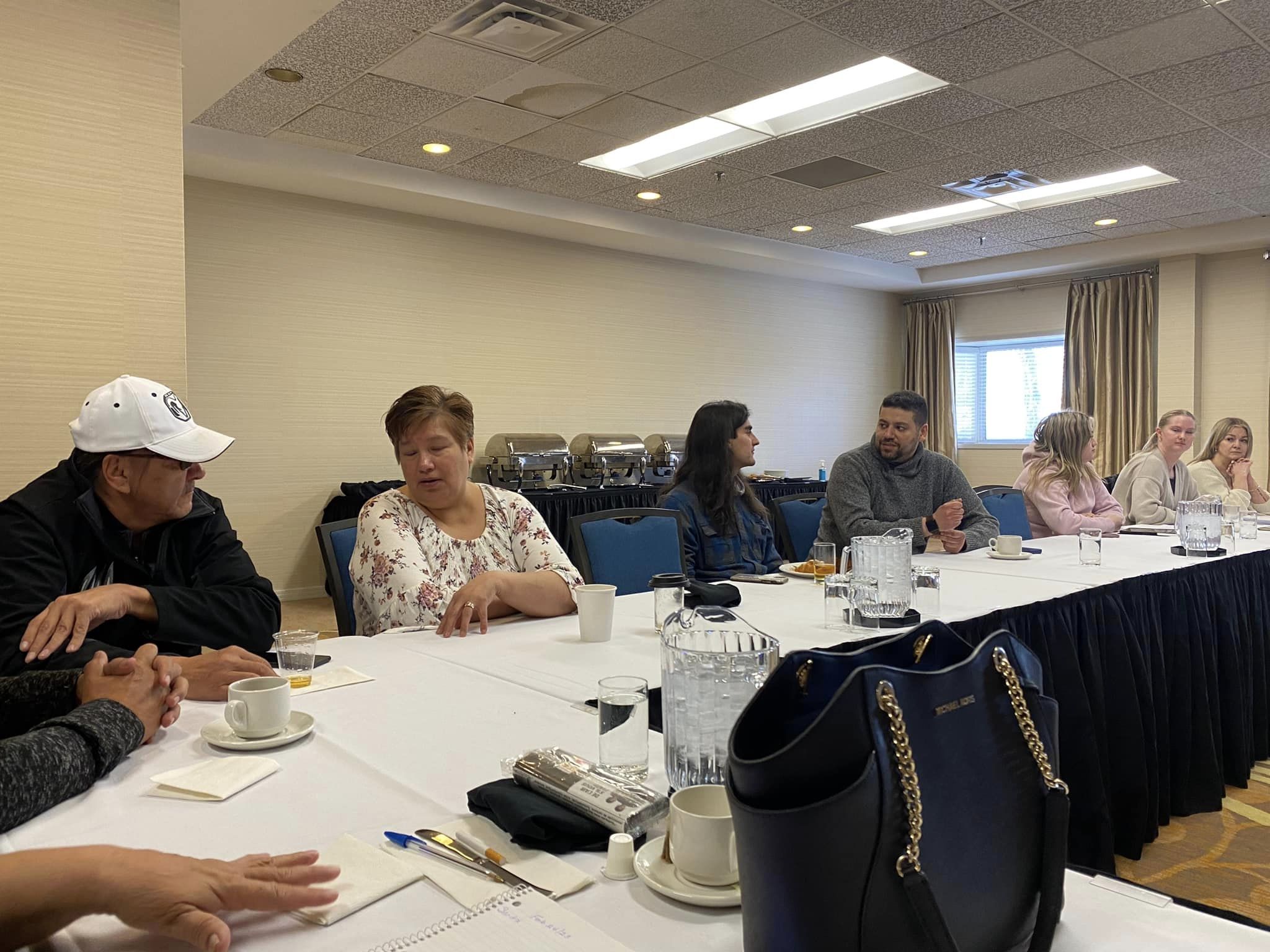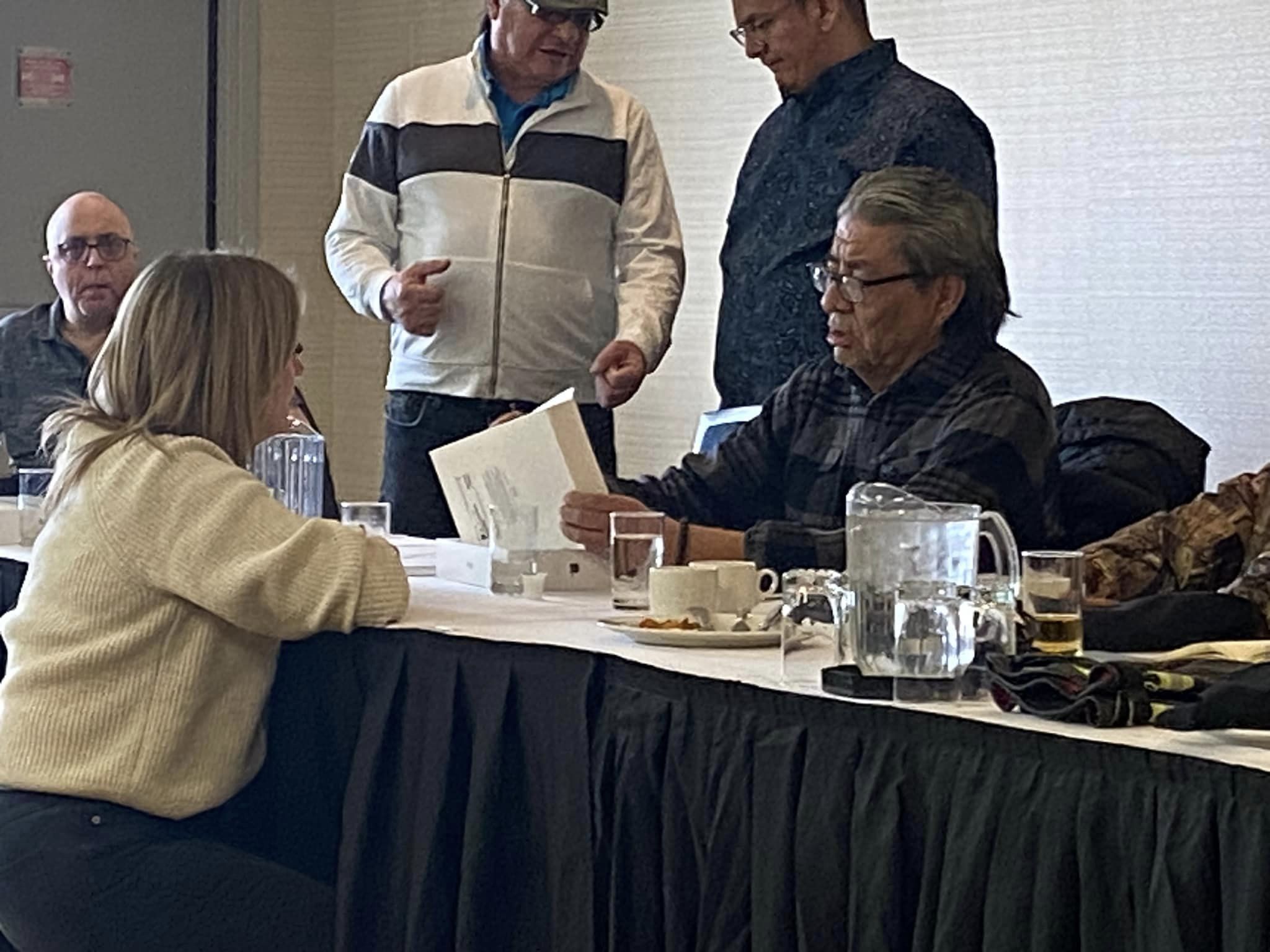Heart Work
How Dr. Stacey Lovo's relationships with First Nations and Métis people ground her work in making healthcare systems more culturally responsive
By Cory BaumgardnerIn 2008, FSIN signed a Memorandum of Understanding with the Government of Canada (Health Canada, First Nations and Inuit Health Branch), and Saskatchewan (Ministry of Health), to improve the health status of First Nations people in Saskatchewan. As part of this work, FSIN led the development of the Cultural Responsiveness Framework, and its three strategic directions: restoring Frist Nations community-based health and wellness systems; establishing a “middle ground” for engagement between mainstream and First Nations systems and worldviews, and transforming mainstream health service delivery to be culturally responsive.
Dr. Stacey Lovo, an assistant professor in the School of Rehabilitation Science at the University of Saskatchewan, and Principal Investigator in the Saskatchewan NEIHR, has worked in partnership with FSIN’s Health and Social Development Secretariat for a decade on projects guided by the Cultural Responsiveness Framework.
Since 2014 d Dr. Lovo has been involved in development and evaluation of The Role of Practitioners in Indigenous Wellness, a self-directed course for healthcare professionals who provide care to Indigenous people. This course is guided by the Cultural Responsiveness Framework, and it was developed and is taught by First Nation and Métis People in Saskatchewan, including Elders, Knowledge Keepers, researchers and healthcare providers.
It is a collaborative project developed by the Division of Continuing Medical Education, College of Medicine, and Continuing Education in Rehabilitation Science, School of Rehabilitation Science, University of Saskatchewan, with assistance from the Canadian Medical Protective Association. The course has the support of FSIN and Métis Nation-Saskatchewan as members of the program advisory committee. It was developed to help health professionals and health professional students learn about the history of colonization in Canada and the resulting impacts that this history has had on First Nations and Métis people, and their experiences of health and wellness.
Read more about Dr. Lovo's work on her website.
In this blog, we meet Dr. Stacey Lovo, and learn more about what drives her to use a culturally-responsive approach to working for systemic changes in healthcare delivery.
Introducing Dr. Stacey Lovo
 Dr. Stacey Lovo is a fourth-generation Canadian who was born and raised in Southern Saskatchewan. An assistant professor at the University of Saskatchewan in the School of Rehabilitation Science, Dr. Lovo’s research focuses on developing virtual care strategies to enhance access to rehabilitative and primary healthcare services in rural and remote Northern Indigenous communities, using collaborative, community-directed approaches. She works with First Nations and Métis stakeholders, scholars, and community members to advocate for culturally-responsive and anti-racist healthcare. As a Principal Investigator on the SK-NEIHR, Dr. Lovo is part of its Research Leadership Team, and she chairs the SK-NEIHR’s Communications and Knowledge Translation Committee.
Dr. Stacey Lovo is a fourth-generation Canadian who was born and raised in Southern Saskatchewan. An assistant professor at the University of Saskatchewan in the School of Rehabilitation Science, Dr. Lovo’s research focuses on developing virtual care strategies to enhance access to rehabilitative and primary healthcare services in rural and remote Northern Indigenous communities, using collaborative, community-directed approaches. She works with First Nations and Métis stakeholders, scholars, and community members to advocate for culturally-responsive and anti-racist healthcare. As a Principal Investigator on the SK-NEIHR, Dr. Lovo is part of its Research Leadership Team, and she chairs the SK-NEIHR’s Communications and Knowledge Translation Committee.
Dr. Stacey Lovo’s work with The Role of Practitioners in Indigenous Wellness Program
Dr. Lovo’s research is inspired by her work with FSIN and the learning she has had the opportunity to receive from FSIN about the Cultural Responsiveness Framework. The vision of this Framework is foundational for the The Role of Practitioners in Indigenous Wellness course, which was created to provide healthcare practitioners with a place to: explore personal reflections, Indigenous worldviews, and how they affect heath care; consider how the past informs the present around access, governance of healthcare systems, the impact of systemic racism on the health of Indigenous Peoples, and think deeply about the challenge of finding a middle ground in healthcare delivery, by providing care through a culturally-responsive lens.
Putting First Nation and Métis peoples first
Dr. Lovo states, “As a part of my work, I have been very careful to develop and maintain relationships over long periods of time. As those relationships grew and COVID came, we realized that we needed a way for Elders to participate in our work without lengthy travel, or without exposing themselves to larger groups.”
While grappling with these realities, Dr. Lovo and her colleagues received $5000 in funding from the SK-NEIHR’s Community Partnership Research Support Program to bring together Elders, Knowledge Keepers and others to develop a research proposal to expand the course content to include land-based experiential learning as guided by Elders and Knowledge Keepers, in The Role of Practitioners in Indigenous Wellness.
 With this funding in addition to other research funds from the College of Medicine, Dr. Lovo worked in partnership with FSIN Health and Social Development Oskapiyos Howard Desnomie, Oskapiyos Regan Ratt-Misponas, and Martin Bembridge to bring together Elders and students from University of Saskatchewan on February 24, 2023 for a digital literacy event. Each Elder was gifted an iPad, and students worked one-on-one with Elders to set them up and help them learn how to use the Ipads for communication. Using these iPads, Elders will be able to provide the larger team with guidance on how to develop the land-based curriculum component for the Practitioners course, as well as consult on important FSIN initiatives surrounding the Cultural Responsiveness Framework.
With this funding in addition to other research funds from the College of Medicine, Dr. Lovo worked in partnership with FSIN Health and Social Development Oskapiyos Howard Desnomie, Oskapiyos Regan Ratt-Misponas, and Martin Bembridge to bring together Elders and students from University of Saskatchewan on February 24, 2023 for a digital literacy event. Each Elder was gifted an iPad, and students worked one-on-one with Elders to set them up and help them learn how to use the Ipads for communication. Using these iPads, Elders will be able to provide the larger team with guidance on how to develop the land-based curriculum component for the Practitioners course, as well as consult on important FSIN initiatives surrounding the Cultural Responsiveness Framework.
The role of reciprocity
 Providing Elders with iPads, along with instruction and support in using them, is one of the ways that Dr. Lovo ensures First Nations and Métis voices are prioiritized. With the iPads, Elders can participate more fully in curriculum design and other Cultural Responsiveness Framework projects, and they are also empowered to use the iPads in their daily lives. Dr. Lovo and her colleagues see these as reciprocal relationships, focusing on the need to protect Elders’ health and wellbeing, and provide them with safe, secure, and easily accessible ways to guide curriculum development, as well as giving them the means to participate in other, similar work, and to use these iPads in their daily lives to maintain their own personal connections.
Providing Elders with iPads, along with instruction and support in using them, is one of the ways that Dr. Lovo ensures First Nations and Métis voices are prioiritized. With the iPads, Elders can participate more fully in curriculum design and other Cultural Responsiveness Framework projects, and they are also empowered to use the iPads in their daily lives. Dr. Lovo and her colleagues see these as reciprocal relationships, focusing on the need to protect Elders’ health and wellbeing, and provide them with safe, secure, and easily accessible ways to guide curriculum development, as well as giving them the means to participate in other, similar work, and to use these iPads in their daily lives to maintain their own personal connections.
Dr. Lovo’s key takeaways
Dr. Lovo refers to this as her "heart work." Her relationships with First Nation and Métis community members, scholars, and mentors are at the centre of this heart work. Through these connections, Dr. Lovo has learned about the importance of being an ally and committing to continuous learning each day. As an ally, she is always looking for better ways to approach work with Métis and First Nations communities, and to ensure that they are consulted appropriately as full partners in projects, she is following proper protocols, and that her work is done in a manner than honours and uplifts people and the communities it supports.
Historical, social, political, economic, and systemic—the effects of colonization have created significant barriers for First Nations and Métis peoples looking to access culturally-appropriate, responsive, and safe forms of care, health, and wellness within the current healthcare systems. “For true equity and improved experiences, safety, and equitable and high-quality healthcare, we need to recognize the importance of prioritizing Indigenous healthcare. Lessons about Indigenous healthcare are critical not only for all Indigenous peoples in Saskatchewan but also for every healthcare provider and anyone involved in the health system,” Dr. Lovo says.
Teaching healthcare professionals about Canada’s history of colonialism and its impacts, bringing students and Elders together to share in intergenerational learning and teaching, being guided by community needs—these are the methods Dr. Lovo is using to work to reduce racism in healthcare, to support First Nations and Métis people as they find healing, and to create a better future and for everyone. Heart work that keeps her energized and engaged every day.
Read more about Dr. Lovo's work on her website.

